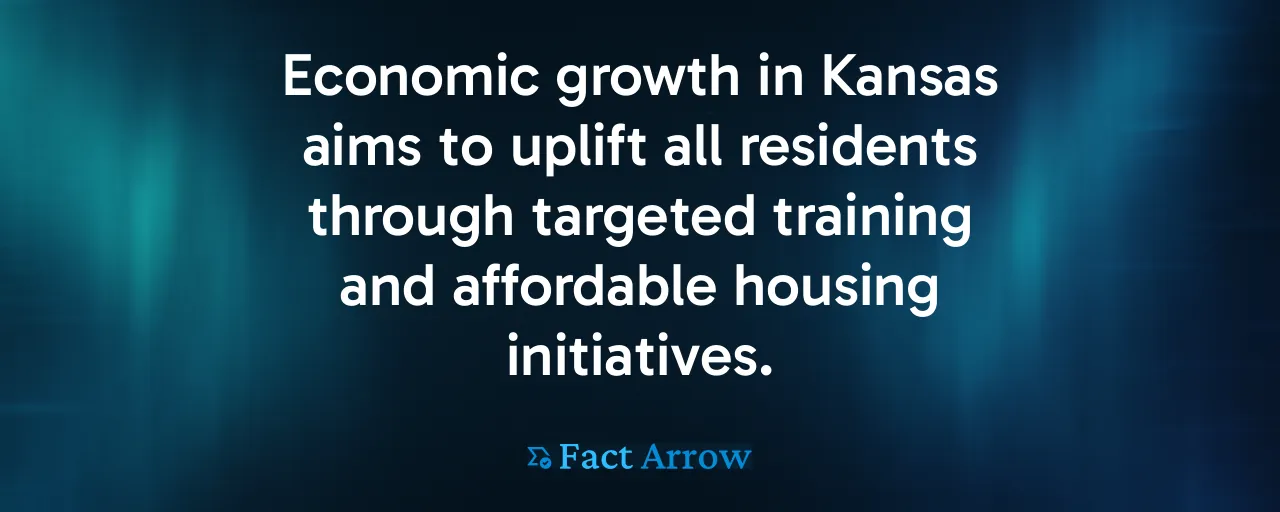A New Economic Dawn in Kansas
Kansas is buzzing with opportunity. In April 2025, Governor Laura Kelly announced that Fiserv, a global fintech giant, will open a massive hub in Overland Park, bringing 2,000 high-paying jobs to the state. The project, set to transform the former Sprint Aspiria campus, signals a bold step toward economic modernization. With salaries averaging $102,000, the hub promises a significant boost to the region's prosperity.
This development represents a significant corporate win, and it offers a chance to redefine Kansas as a hub for innovation while addressing longstanding challenges like job access and housing affordability. The state's strategic use of incentives, paired with investments in education and infrastructure, sets the stage for a new era of growth. The real test involves ensuring this prosperity reaches all Kansans.
The Fiserv deal, valued at $6.5 billion in economic impact over a decade, reflects a broader trend. Since 2019, Kansas has secured over $20 billion in private investment, reversing the fiscal scars of the Brownback tax-cut era. This moment demands a vision that prioritizes equity and sustainability alongside economic gains.
Jobs That Lift Everyone
The promise of 2,000 six-figure jobs is transformative, provided those opportunities are accessible. Kansas aims to ensure that women, minorities, rural residents, and veterans can tap into this fintech boom. Targeted workforce programs, like partnerships with community colleges and universities, can create pathways through certificates and apprenticeships tailored to fintech roles.
Fiserv's $4 billion payroll projection suggests a ripple effect. Each high-tech job could generate nearly two additional jobs in retail, housing, and services, according to economic modeling. Local businesses, from restaurants to childcare providers, stand to benefit. Without deliberate action, however, these gains risk concentrating in urban Johnson County, leaving rural areas behind.
Historical data supports this approach. States that pair incentives with robust training programs see stronger local hiring and wage growth. Kansas can lead by tying Fiserv's $155 million incentive package to benchmarks for diverse hiring and local employment, ensuring the hub uplifts underrepresented groups.
Guarding Against Growing Pains
Economic booms often come with trade-offs. Rising property values from the Fiserv hub could expand local tax bases, funding better schools and services. These changes also risk spiking housing costs, pricing out longtime residents in Johnson County. Kansas aims to act swiftly to expand affordable housing and transit options to prevent displacement.
Labor market pressures are another concern. High salaries may draw out-of-state talent, tightening competition for local firms. Smaller businesses could struggle to match wages, underscoring the need for state-supported training to grow the local talent pool. Investments in broadband and transit can also make Overland Park a viable commute for rural workers.
Transparency is critical. Past incentive deals in Kansas have faced scrutiny for opaque terms. Requiring Fiserv to report wage levels, workforce demographics, and local spending annually can build public trust and ensure the project delivers on its promises.
Learning From the Past
Kansas' economic journey offers valuable lessons. The 2012 Brownback tax cuts slashed revenue, gutting public services and stalling growth. Their bipartisan reversal in 2017 paved the way for fiscal recovery, enabling investments that attracted projects like Panasonic's 2022 battery plant and now Fiserv. This shift shows the power of balanced, strategic policy.
Research backs this strategy. States that invest in education, infrastructure, and targeted incentives often outperform those relying solely on tax cuts. Kansas' record-breaking private investment since 2021, alongside balanced budgets, proves that public-private partnerships can drive growth without sacrificing stability.
Equity remains a challenge. Previous megaprojects have sometimes widened urban-rural divides. Kansas can break this cycle by ensuring Fiserv's benefits extend beyond Overland Park, through training programs and infrastructure that connect rural communities to opportunity.
Building a Sustainable Future
The Fiserv hub is a chance to set a national standard. By tying incentives to local hiring, wage standards, and diversity goals, Kansas can ensure that economic growth benefits all residents. Expanding childcare, transit, and housing will support a diverse workforce and prevent inequality from taking root.
Collaboration is key. Fiserv, state officials, and local colleges aim to work together to build a robust talent pipeline. Earmarking property-tax revenue for social infrastructure can address housing and transit needs, while regular audits of the project's impact will keep the public informed and policymakers accountable.
This moment calls for bold action. Kansas has the opportunity to grow its economy and create a model for inclusive, sustainable prosperity. By prioritizing equity and transparency, the state can ensure that its fintech boom leaves no one behind.
